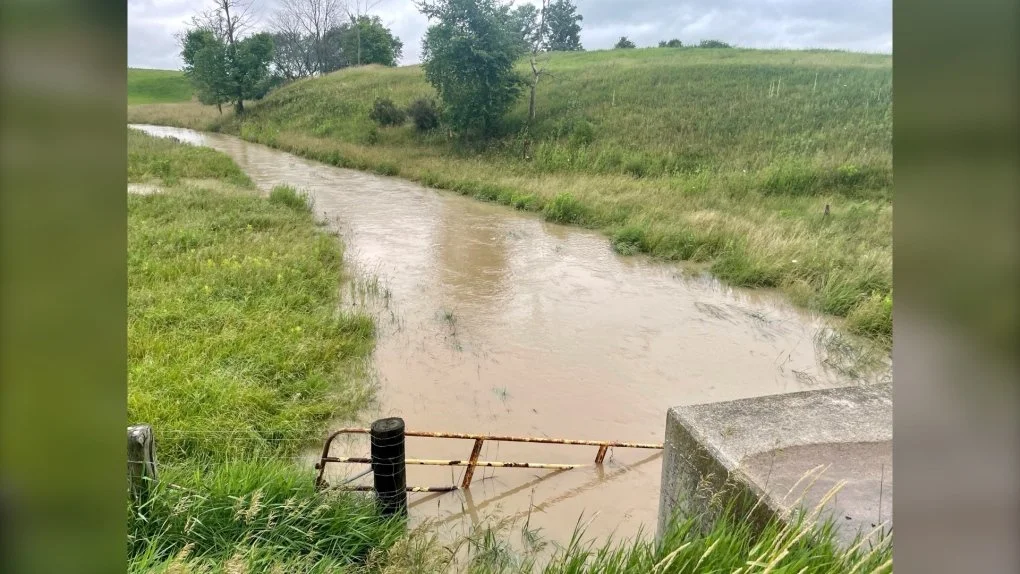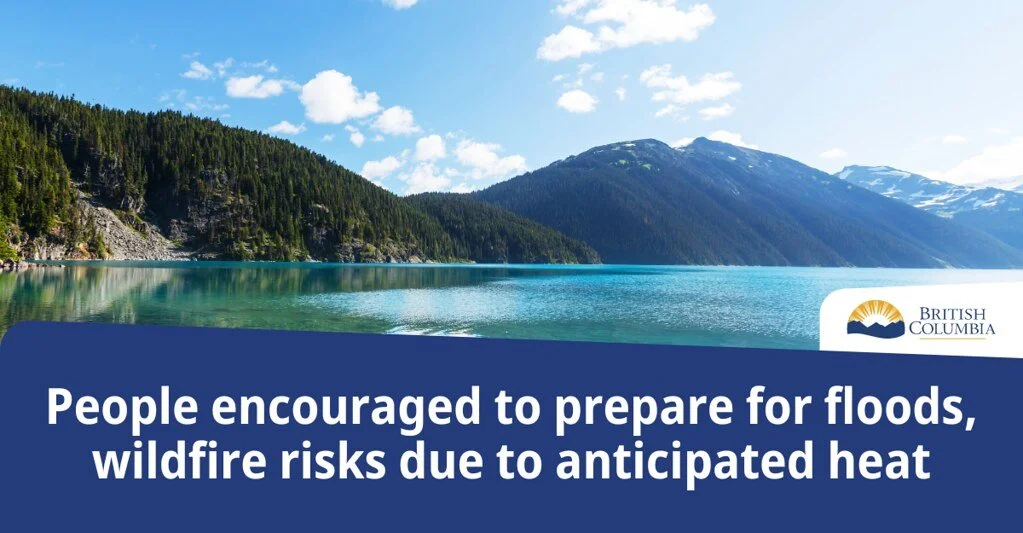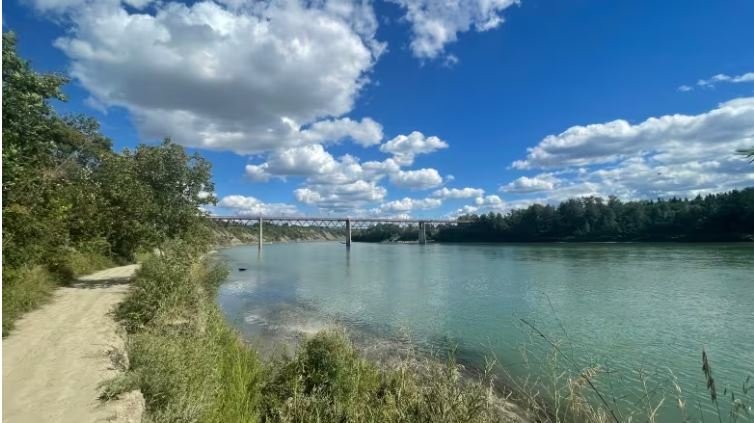A coastal First Nation’s Guardian team is gearing up to test the waters to try to limit the impacts of drought in their traditional territories on northeast Vancouver Island. The We Wai Kai First Nation's environmental stewards are partnering with other local groups to map and monitor wetlands, watersheds and streams on Quadra Island as summers get hotter and drier, said Guardian program manager Shane Pollard. Drought in the northeastern Vancouver Island water basin, which includes We Wai Kai territory and Quadra Island, is increasingly common.
‘Air-Conditioning’ Rivers and Streams Could Save Overheated Fish
And a new threat is gradually emerging. Water temperatures are warming, thanks to a combination of climate change and human water management techniques. And in some places they’re growing hot enough to kill the fish. “We’ve seen instances where we’ve had die-offs of coldwater species,” said Kathryn Smith, a doctoral candidate in the Coastal Hydrology Lab at Dalhousie University in Canada.
Canada's lakes are becoming less blue — but that could be good for fish
If you drive the Icefields Parkway through the Canadian Rockies, you'll pass multiple turquoise-coloured lakes that are popular with tourists for taking photos. The lakes get their iconic colour from rock flour, which is similar in appearance to baker's flour used for making bread. Rock flour is made from glaciers grinding rocks into powder, which can take thousands of years.
Ontario Supporting Local Projects to Protect the Great Lakes
The Ontario government is investing $6 million to support 30 multi-year projects to help protect, conserve and restore the Great Lakes. These investments will help reduce plastic litter, excess nutrients and road salt entering lakes, rivers and streams, advance climate resiliency, and make significant progress on restoring environmentally degraded areas of the Great Lakes.
'The ground can’t handle any more water': UTRCA
Rivers, creeks, and streams are beginning to turn amidst the pressure of flood waters. While the City of London escaped heavy rain Wednesday evening through Thursday morning, some areas north and west of the city were not as fortunate. The Upper Thames River Conservation Authority (UTRCA) issued a flood alert. It follows several days of storms that have left the earth saturated.
Texas poised to pour billions into water infrastructure
Climate change has brought higher temperatures in Texas that has accelerated reservoir evaporation and created arid conditions. That has reduced water volumes flowing into rivers and streams. State data indicates reservoir storage was only about 67 per cent of capacity last October from a year earlier. The 30 million people living in Texas cannot survive without water. The state’s rapid economic and population growth has put strain on existing water infrastructure. Even before taking that growth into account, time has taken its toll on water infrastructure, particularly in rural areas. About 132 billion gallons of water were lost in 2021 through breaks, leakage and other causes, according to data submitted by public water suppliers to the Texas Water Development Board (TWDB). Old leaky pipes not only waste water but can increase health risks due to contaminants like arsenic.
Weather, conservation agencies warn heavy rainfall can bring flash floods throughout GTA Social Sharing
Heavy rainfall and isolated thunderstorms are expected to hit pockets throughout the GTA Saturday, which can bring about flash floods, water pools on roads and localized flooding in low-lying areas, Environment Canada warns. The federal weather agency says 50 to 75 millimetres of rain is possible in areas as far west as Guelph to east beyond Kingston. Heavy showers have already begun and are expected to continue on and off throughout the day, with a forecasted end this evening.
"Anticipate challenging conditions": Jasper warns visitors after 70 cm of snow
On Monday, the park received up to 100 mm of precipitation in some areas, falling as both snow and rain. The high-elevation areas, such as the Skyline trail, received an estimated snow accumulation of up to 70 cm, while lower elevations experienced lesser amounts. The heavy snowfall resulted in widespread tree damage, making travel conditions on trails challenging and, in some cases, impassable, with Parks Canada having to rescue dozens of people who were left stranded in some areas.
Salmon are dying in dried-up river beds in northern Yukon
Yukon River chinook and chum salmon in the Old Crow region of the territory are being hit with the perfect storm — not only are this year's runs expected to be dismal, but the life cycle of the salmon is being broken. Over the last several years, lower numbers of chinook and chum salmon have made the long journey from the ocean to creeks and streams at the mouth of the Porcupine River, spawned, and then died. The small fry would then make their way back to the Bering Sea in spring. But now many of the fertilized eggs left behind in the rivers are dying because large stretches of river are drying up in the early spring — and it's not exactly clear why.
People encouraged to prepare for floods, wildfire risks due to anticipated heat
The forecast heat is expected to accelerate the snowmelt at higher elevations, which will increase pressure on the province’s rivers and streams. The River Forecast Centre is monitoring weather patterns and river conditions, and the River Forecast Centre website has updated flood warning and advisory notifications, including a map of areas of heightened flood risk. The RFC is forecasting increasing flooding hazards in the B.C. Interior over the weekend and through next week due to rapid snowmelt. Key areas of concern include the Fraser River from Prince George through the Fraser Canyon, Cariboo Mountains, North Thompson, South Thompson, Shuswap, Similkameen, Kootenay and Skeena regions.
Coastal GasLink hit with more stop work orders over water pollution concerns
Coastal GasLink has been issued stop work orders on a stretch of pipeline construction for the second time in just over a week, the latest in a pattern of environmental violations for polluting sensitive waterways. The pipeline project crosses about 625 lakes, rivers, creeks, wetlands, and streams in northern B.C. On Tuesday, the BC Environmental Assessment Office Compliance and Enforcement Branch said it had issued four stop work orders to Coastal GasLink late last week because erosion and sediment were negatively impacting the upper Anzac River watershed, about 130 kilometres northeast of Prince George.
Logging near streams in B.C. Interior is warming water and threatening coho salmon: study
Decades of logging activities near rivers in B.C.'s Interior are driving up the temperatures of coho salmon habitats and threatening the species' survival, according to a new study. The study by Simon Fraser University and Fisheries and Oceans Canada (DFO), published last month in the Canadian Journal of Fisheries and Aquatic Sciences, looked into 28 tributaries of the North Thompson River watershed from Kamloops to Valemount.
How the health of a river is influenced by what's happening on land
For some residents of northern Alberta and Saskatchewan, the North Saskatchewan River is nothing more than a flowing body of water that starts at the Saskatchewan Glacier in Banff National Park and winds its way northeast. But it's much more than that. The river is a part of a bigger network of streams and channels that feed into it on its path through the Prairies. We're talking about a watershed — an area of land that drains into a water body.
Peter S. Ross: We need to understand the extent to which floods further degrade fish habitat
With government agencies dealing with the urgent public safety needs of the day, the health of fish habitat ranked low on the list of priorities. But as floodwaters rose, the distinction between terrestrial and aquatic habitats blurred, salmon and sturgeon swam across farmers’ fields, and contaminants from human activities washed unfettered into streams and rivers.
Is road salt killing salmon in B.C. streams? UBC researchers trying to find out
University of B.C. researchers are embarking on a five-year study to find out whether road salt is contributing to salmon mortality in B.C. streams. The team, led by Patricia Schulte, Chris Wood and Colin Brauner, also involves dozens of volunteer stream-keepers at 30 streams or creeks. Schulte, a professor in the Department of Zoology at UBC, said as the ice melts on the roads, it runs down into freshwater streams or can seep into the groundwater. Researchers know the salt can harm baby salmon or trout but what they don’t know yet is how much of the salt is winding up in the water.
Salmon struggle to spawn amid record-setting drought, with hundreds dead in B.C.
After three parched months, much of B.C. is experiencing drought and ongoing hot weather has left streams running dry, leaving no way for some salmon to return to their spawning grounds, killing hundreds in a mass die-off on the province's central coast. The situation has scientists and salmon watchers concerned. The Pacific Salmon Commission initially projected a return of 9.8 million fish to the Fraser River this year. By August, predictions were reduced to 5.5 million. This was readjusted again, on Sept. 28, to 6.8 million. There were record-low rainfalls in September, and dry weather and heat has continued into October, a month known for rain. For some migrating salmon, that lack of moisture is proving deadly.
Warning issued for possible blue-green algae bloom at Cunard Lake Beach
Halifax Regional Municipality is warning people to avoid swimming at Cunard Lake Beach in Halifax due to a possible blue-green algae bloom. Blue-green algae, or cyanobacteria, are microscopic bacteria that live in surface water like lakes, ponds, rivers and streams that can be dangerous to people and pets. The organisms can multiply rapidly during the hot summer months and may release toxins into the water when the blooms die.
Wet'suwet'en chiefs arrive in Six Nations for 'landmark discussions,' starting 18-day tour
Wet'suwet'en Hereditary Chiefs weren't surrounded by the towering pine trees and snow-capped mountains found in northern B.C., but they still found a feeling of familiarity while standing outside a traditional longhouse on Six Nations of the Grand River in Ontario on Tuesday. The traditional chiefs met with Haudenosaunee Hereditary Chiefs to discuss common ground and spread awareness about their battle for land sovereignty back in B.C.
Whiteshell state of emergency extended to July 18
The Manitoba government has extended its state of emergency declaration in Whiteshell Provincial Park as water levels remain higher than normal. Although conditions have improved on the Winnipeg River and many lakes and streams, some areas of the southeastern Manitoba park remain hazardous, the province's Environment, Climate and Parks department said in a news release Friday. The original state of emergency declaration was set to expire June 19. The new one will expire on July 18, although it could be rescinded before then if it is no longer needed.
Your letters for June 10, 2022
Earlier this week, I thought about the amount of water it takes to wash one’s glasses. The same amount of water is required for an entire day by a family of four in some parts of Africa. In Canada, we are lucky to have the greatest supply of water per square foot than anywhere else in the world. It is also the cleanest. It amazes and amuses me that we still buy bottled water from suppliers who use our water to sell back to us. Do we waste any of our precious water? Yes, we do, in countless ways. Do we give away our water to the U.S.? Yes, we do, and often we fail to collect, due to Chapter 11 bankruptcies that frequently occur south of the border.





















